#hsi wu
Text

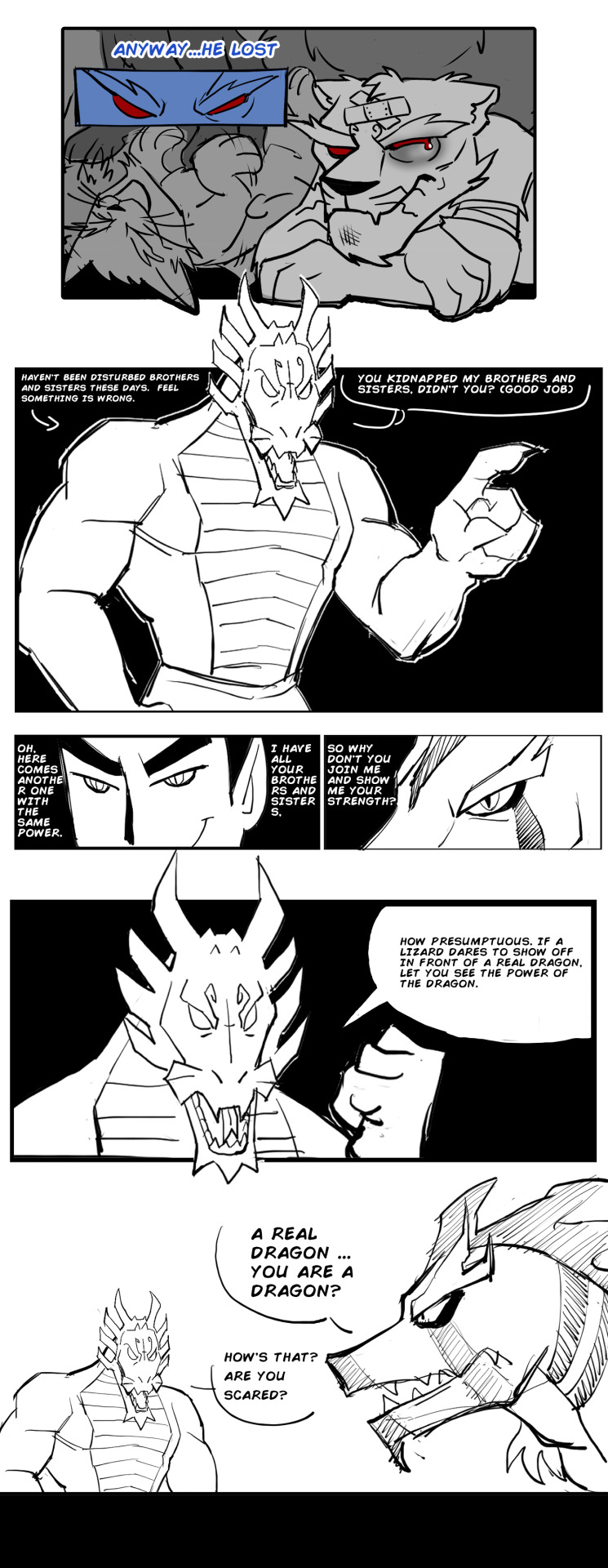

I translated it into English, but my English is not very good. I used a translator. There may be translation errors. Please excuse me.˃ʍ˂ ˃ʍ˂ ˃ʍ˂
#xiaolin showdown#chase young#jackie chan adventures#Bai Tza#Dai Gui#Hsi Wu#Po Kong#Tchang Zu#Tso Lan#Xiao Fung#Shendu#jca
113 notes
·
View notes
Text
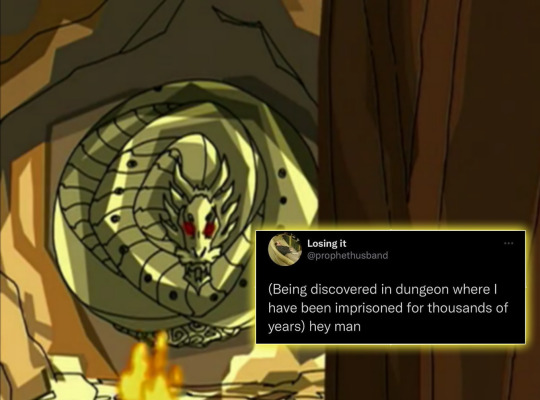

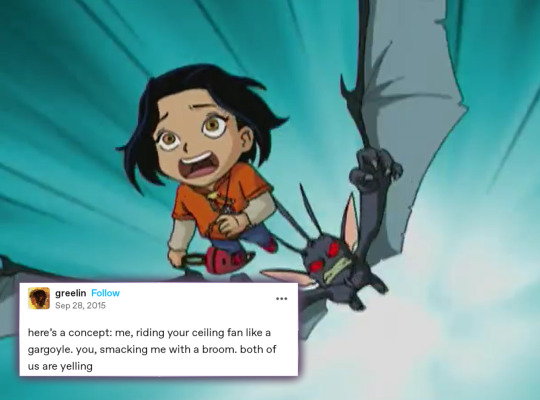
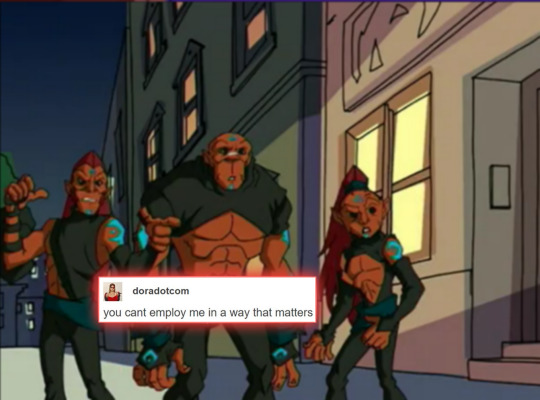
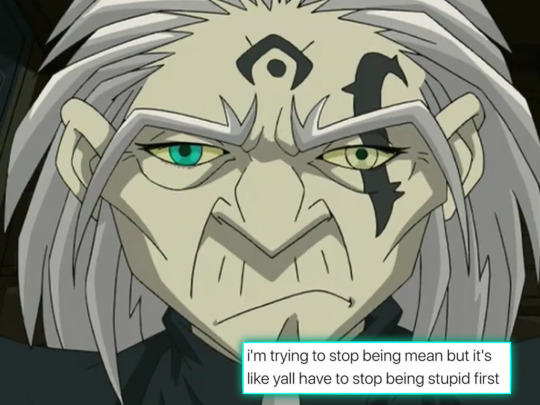


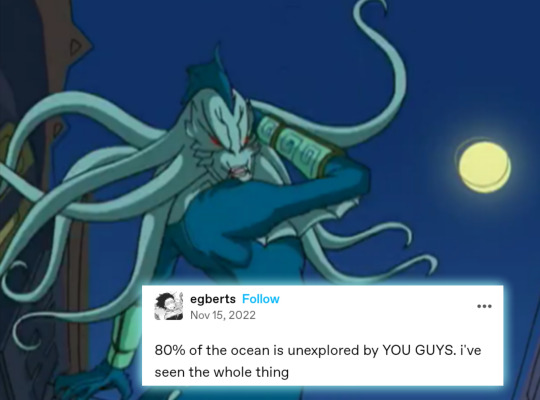


Back at it again

#Jackie Chan Adventures#JCA#jca enforcers#Uncle Chan#Daolon Wong#JCA Finn#JCA Ratso#JCA Chow#JCA Tohru#JCA Valmont#Bai Tza#JCA Jackie chan#Agustus Black#El Toro Fuerte#Text post meme#Jade Chan#Hsi Wu#Shendu
15 notes
·
View notes
Photo
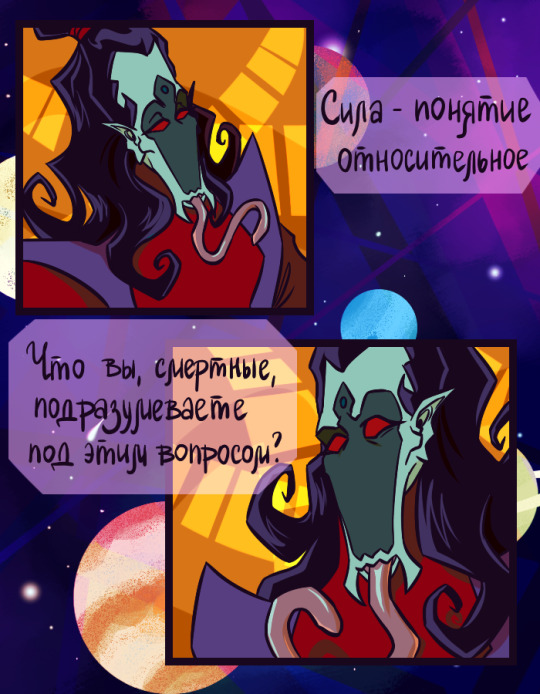

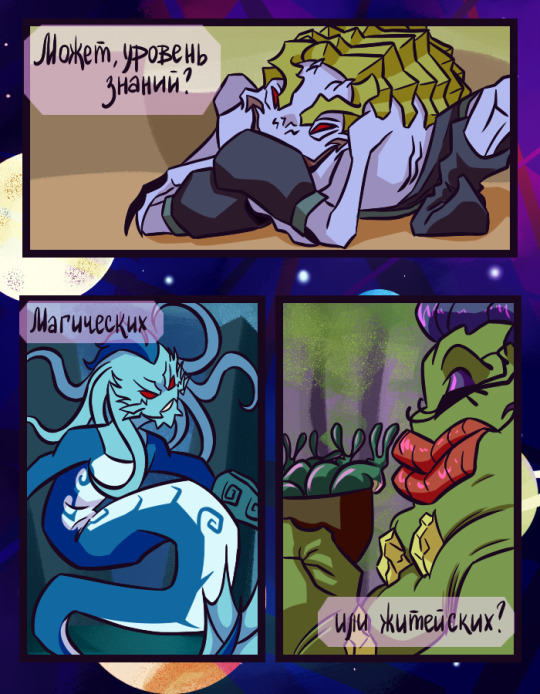
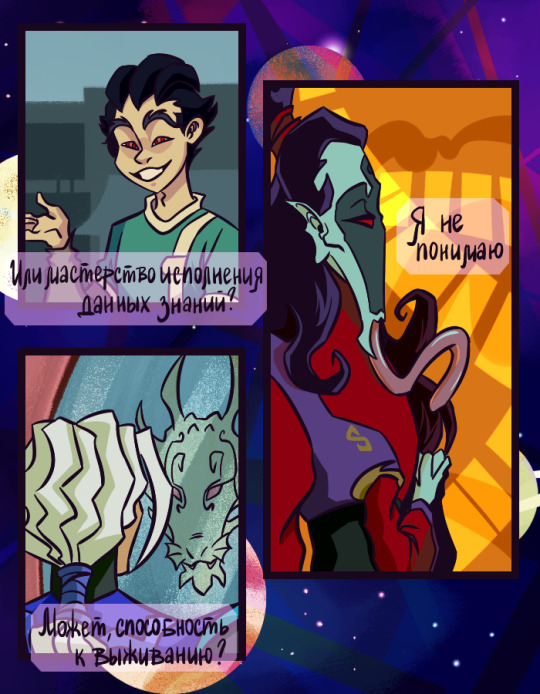
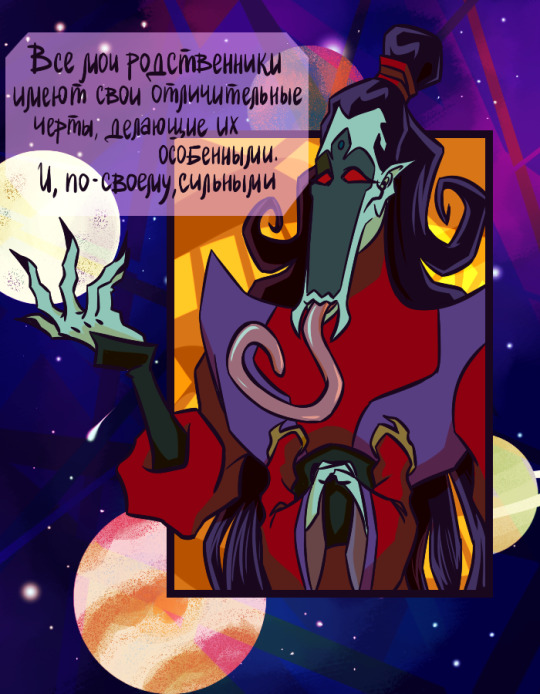

There is an ask for this TV series on VK, and there I took the roles of Tso Lan and Hsi Wu. I put so much time and effort in this comic so I really wanted to share it with you. There is a translation in the captions for each page. I hope you like it
The question: Who do you think is the strongest among your siblings?
76 notes
·
View notes
Text
Jackie Chan Adventures: Demons Familiar
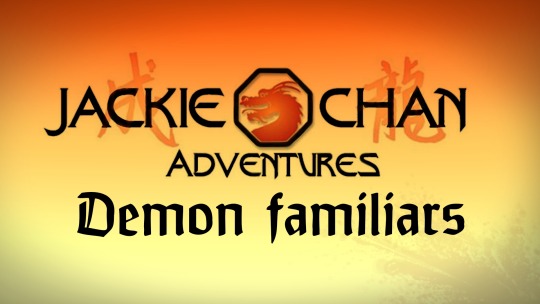
ENG.
I greet you all. And this is the idea for the JCA AU. Those who want can take it, I allow it.
So - demon familiars, or as they are also called Demon sorcerers. Usually I imagined the main eight demons as the children of the progenitor of dark chi, but I came up with the idea that sorcerer demons are the name of special servant demons. Each of them has their own rank, from beginner, to elites and even gods. Their affiliation and meaning can vary, from a simple servant, guide and right-hand man, to a warrior, personal bodyguard and martial artist. Also, each of them has its own mark or sign denoting this or that demon, especially for the highest and elite.I think eye color can also depend, but not on the level, but on the group of demon sorcerers. The main ones are yellow, red, blue, green and in rare cases purple. But at the same time, hostility usually did not arise between groups of demon sorcerers.
One more thing, about their owners. Usually, the master, the master, the owner most often becomes a magician, no matter dark or light, but ordinary people and other demons can also become them. Thanks to a collar or mark, the owner himself can determine whether the familiar will be free or forever servants whose orders must be carried out without question.
The lore of this AU is as follows. One day, 8 representatives of the elite demon sorcerers - Tso-Lan, Po-Kong, Xiao-Fung, Dai-Gui, Tchang-Zu, Shendu, Bai-Tsa and Hsi-Wu decided to rebel and become not just servants, but higher demons that could dominate mortals. As soon as they were able to free themselves from shackles and go free, they began to jointly conquer lands and the state, destroying enemies along the way. It all ended in defeat for ordinary people. For several centuries and generations they ruled the world, creating their own laws and state, but one day they were overthrown and expelled by eight immortals, and imprisoned forever in oblivion. The demons tried in every possible way to get out, but everything ended in defeat and return expulsion. One day, they decided to give them a chance for the right to freedom if they returned to who they originally were - familiars. Most of them were against it, but they understood that there was no choice and they agreed.
Something like this... I hope you liked it. I know both English and Russian text here, but just in case someone is interested in what I originally wrote.
RUS.
Я вас всех приветствую. И это идея для АУ по ПДЧ. Те кто хотят могут брать я разрешаю
Итак - демоны фамилияры или как их еще называют Демоны колдуны. Обычно я представляла ну основную восьмерку демонов как дети прородителя тёмной ци, но у меня в голову пришла идея о том что демоны колдуны это название особых демонов слуг. У каждого из них есть свой ранг, от новичка, до элит и даже богов. Принадлежность их значение могут быть разными, от простой слуги, проводника и правой руки, до воина, личного телохранителя и мастера боевых искусств. Так же каждый из них имеет свою метку или знак обозначающий тот или иной демон, особенно это касается высших и элит. Цвет глаз думаю так же может зависеть, но уже не уровень а группу демонов колдунов. Основные это желтый, красный, синий, зелёный и в редких случаях фиолетовый. Но при этом обычно не возникало вражда между группами демонов колдунов.
Ещё кое что по поводу их хозяев. Обычно хозяином, мастером, владельцем чаще всего становится маги, неважно темные или светлые, но так же ими могут стать обычные люди и так же другие демоны. Благодаря ошейнику или метке, владелец сам может определить будет ли фамилияр свободными или вечно слугами чей приказ должен выполняться без прикословно.
Лор этого АУ тут таков. Однажды в один из дней, 8 представителей элит демонов колдунов - Тсо-Лан, По-Конг, Ксяо-Фанг, Даи-Гуи, Тчанг-Зу, Шенду, Бай-Тса и Хси-Ву решили восстать и стать не просто слугами, а высшими демонами, которыми могли бы властвовать над смертными. Как только смогли освободиться от оков и выйти на волю, они общими усилиями начали завоёвывать земли и государство, уничтожая врагов на своем пути. Все закончилось поражением для обычных людей. В течение нескольких веков и поколениями они правили миром, создавая свои законы и государство, но в один из дней их свергли и изгнали восемь бесмертных, и заточили навсегда в небытие. Демоны пытались вся чески выбраться, но все оканчивалось поражением и обратное изгнание. Однажды, им все таки решили дать шанс на право свободу, если они вернуться к тому кем они изначально были - фамилиярами. Большинство из них было против, но понимали что выбора нету и те согласились.
Как-то так.. надеюсь понравилось. Знаю тут и английский и русский текс, ну просто вдруг кому-то будет интересно что я изначально писала.
#jackie chan adventures#alternate universe#Jackie Chan Adventures: AU familiar#Familiar#Demon#ideas#AU#Po Kong#Dai Gui#Tso Lan#Hsi Wu#Bai Tsa#Shendu#Tchang Zu#Xiao Fung#Demon sorcerers#Ideas for AU
8 notes
·
View notes
Text
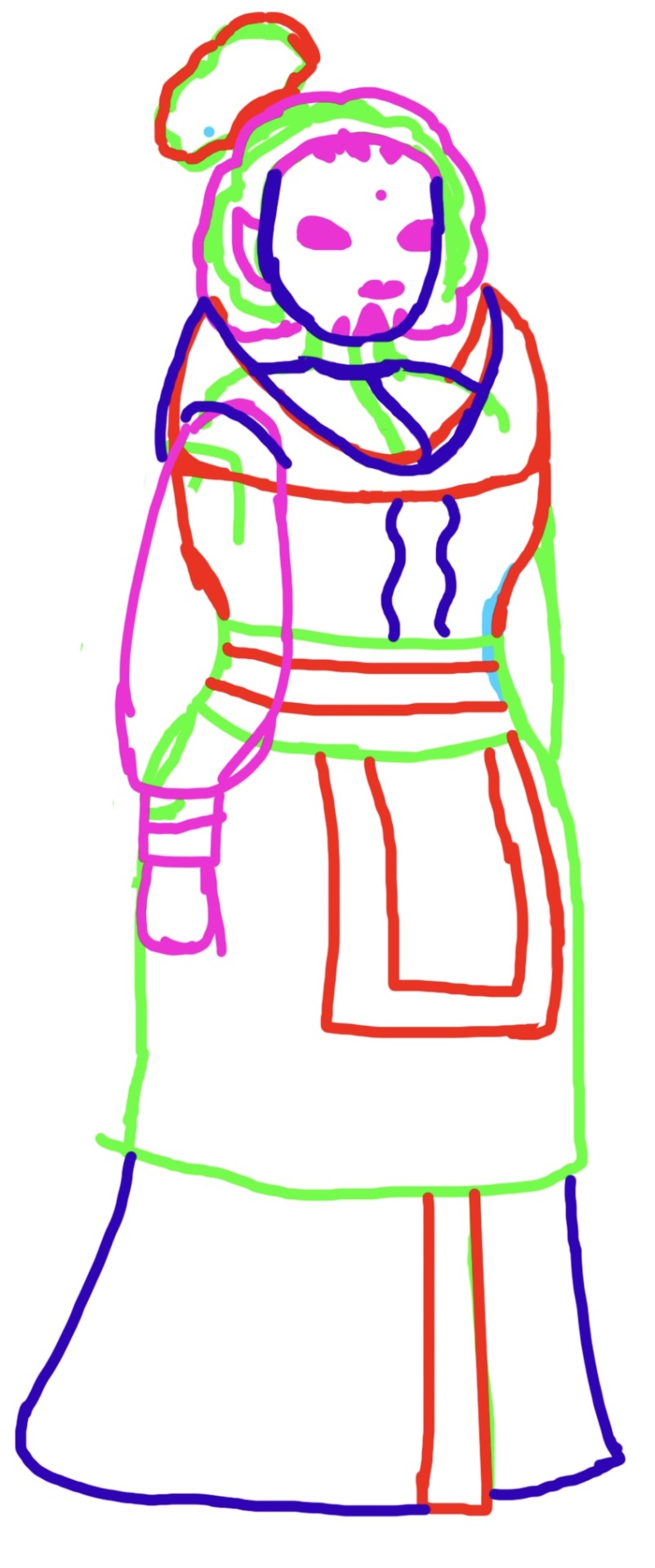
A WIP of a project of mine that I have lost interest of coming.
Back around 2016 I wanted to due a element swap with the demon sorcerers.
Po Kong was to swapped with Tso Lan.
If you who else was to swap with who:
Xiao Fung and Hsi Wu
Dai Gui and Tchang Zu
Bai Tza and Shendu
Feel free to draw this and tag me.
#jackie chan adventures#jca#po kong#wip#demon swap#my art#tso lan#shendu#xiao fung#hsi wu#dai gui#tchang zu#bai tza
4 notes
·
View notes
Text
insane how the imagery of polaroid pictures kinda morphs throughout scissor seven and how like the first season and a bit the second one they are almost exclusively used for assassination targets and passed around to be torn apart (metaphorically)
but by season three they're a stable of seven's memories and love and the life that he adores and how they are falling apart and burning away around him
and by season four we see white fox quite literally ripping them away from their home and the place seven loves and giving them this condescending glare. and both good and bad memories surround us and float by during the intro.
#The real question is how are these motherfuckers getting polariods#They all use fuckin mobile phones#Seven keeping a bigass polariod the size of hsi hand in his pocket jsut in case#scissor seven#killer seven#wu liuqi#seven
19 notes
·
View notes
Photo

Yi Yi
directed by Edward Yang, 2000
#Yi Yi#Edward Yang#movie mosaics#Chen Hsi-Sheng#Wu Nien-jen#Elaine Jin#Ru-yun Tang#Kaili Peng#Jonathan Chang#Su-Yun Ko#Kelly Lee
3 notes
·
View notes
Text
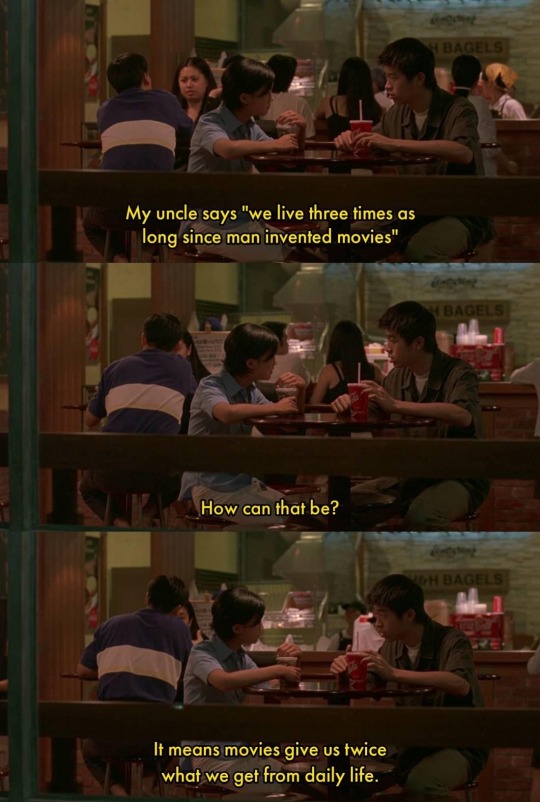
Yi Yi (2000)
Dir. Edward Yang
#yi yi#edward yang#taiwan#wu nien jen#Kelly Lee#jonathan Chang#issey ogata#Elaine jin#hsi-sheng chen#movie#film
2 notes
·
View notes
Note
Hi! You seem to be the JTTW expert and I was wondering if you could clarify something for me; If I understand correctly, Wujing ate 9 of Tripitaka’s previous incarnations, right? If so, shouldn’t he be super-powered by all of them? After all, the reason the demons want to eat him is because Tripitaka cultivated power in his previous lives, which will give them immortality and power. Didn’t that apply to the previous monks?
The 13th-century oral JTTW openly states that Sha Wujing's antecedent has continually eaten Tripitaka:
Deep Sand said: "I am the one who devoured you twice before, monk. Slung from my neck are all your dry bones!" (Wivell, 1994, p. 1190).
深沙云:「項下是和尚兩度被我吃你,袋得枯骨在此。」
And since Tripitaka is the tenth reincarnation of Master Golden Cicada and Sha claims to have eaten nine previous scripture pilgrims (Wu & Yu, 2012, vol. 1, p. 210), it's reasonable to assume that Sha has eaten the monk's past nine lives. However, to my knowledge, JTTW never openly states that the Buddhist master had made previous attempts in his past lives to travel to India, or that he had been eaten by Sha in the process (someone please correct me if I'm wrong).
It's important to remember that Tripitaka, better known as Xuanzang (玄奘, 602-664), is not the only Chinese monk who has traveled to India for scriptures. Another famous scripture pilgrim is Faxian (法顯, 337- c. 422). So, the novel could be referring to other such monks.
But if we were to view the aforementioned nine monks as Tripitaka's past lives, I think the reason why Sha Wujing isn't empowered by their flesh is because their compounding life-long austerities only results in the tenth and final reincarnation being holy.
Fun Fact: The "Deep Sands" demon mentioned above is actually a vilified version of a spirit said to have originally helped Xuanzang in his 7th-century biography. This figure came to be worshiped as Jinja Taishō (深沙大將, “General of the Deep Sands”), a minor protector deity in Japanese Buddhism. One 11th-century Japanese source claims that the General manifested before Faxian in a wrathful form. Most importantly, the skulls around his neck are said to be those of demons, not monks (Dudbridge, 1970, p. 20)!
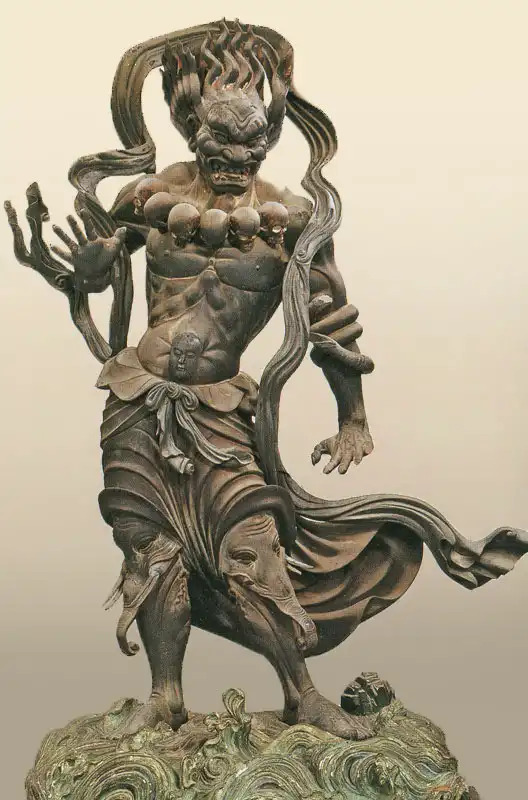
A 13th to 14th-century Japanese Kamakura carving of the General of the Deep Sands.
Sources:
Dudbridge, G. (1970). The Hsi-yu chi: A Study of Antecedents to the Sixteenth-Century Chinese Novel. Cambridge: Cambridge Univ. Press.
Wivell, C.S. (1994). The Story of How the Monk Tripitaka of the Great Country of T’ang Brought Back the Sūtras. In V. Mair (Ed.), The Columbia Anthology of Traditional Chinese Literature (pp. 1181-1207). New York: Columbia University Press.
Wu, C., & Yu, A. C. (2012). The Journey to the West (Vols. 1-4) (Rev. ed.). Chicago, Illinois: University of Chicago Press.
#Sha Wujing#Sandy#Friar Sand#Xuanzang#Tang Monk#Tripitaka#Tang#Journey to the West#JTTW#Lego Monkie Kid#LMK#Sun Wukong#Monkey King#MK
103 notes
·
View notes
Text
What is Taoism?
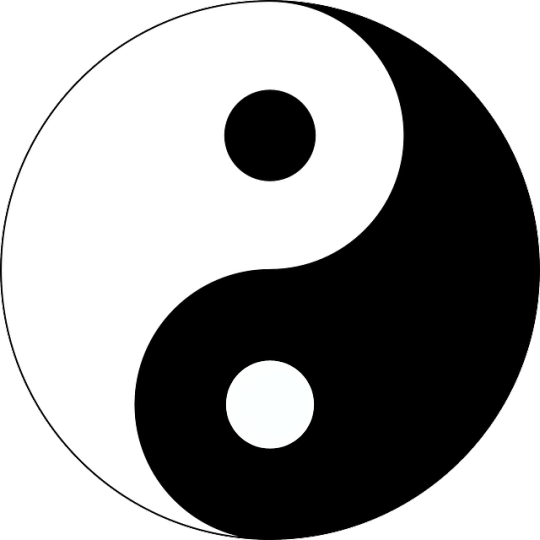
Taoism originated in China between 600 and 500 BC, but the roots of Taoism can be traced back to shamanic practices from the earliest tribal communities. The Chinese word for shaman (wu) was first recorded during the Shang Dynasty (1600-1046 BC), but it is believed that these traditions date back to the very origins of Chinese culture. In fact, many of the stories surrounding Fu Hsi (or Fu Xi), the mythological founder of Chinese civilization are very shamanic. For example, Fu Hsi is considered the originator of the I Ching, an ancient Chinese divination text and the basis of Chinese thought. According to legend, he discovered the symbols of the I Ching in the pattern of markings on the back of a turtle that emerged from a river. This is a classic shamanic tale that combines nature and divination, resulting in the attainment of profound knowledge.
Philosophical Taoism, often represented by the yin-yang symbol, emphasizes living in harmony with the Tao (the Way), or Ultimate Reality, a presence that existed before the universe was formed and which continues to guide the natural world and everything in it. Tao is the ultimate source and way (or process) of nature and the universe. To live in harmony with the Tao is to go with the flow of life rather than against it. It is a way to conserve life's vitality by not expending it in the useless ways of friction and conflict. Early Taoists perceived that the ultimate nature of this mysterious force was beyond intellectual comprehension but could be discerned by the intuitive mind. The sages observed that through meditation, one could attain Tao or communion with the way of the universe itself.
Through meditation and other devotional activities, Taoists seek to bring their lives into accord with the Tao. They believe that by abiding in the Tao, or in harmony with the Cosmos, one may attain a state of such inner clarity and insight that all actions become synchronous and spontaneously correct. They refer to this state of harmony with nature and the universe as wu wei, or "non-doing." Non-doing is not a withdrawal from action, but rather the achievement of a higher kind of action: action in accord with the natural order. The concept of wu wei more closely suggests a way of existing without conscious effort, as nature does. Such a person knows what to do by abiding in a state of quietism, by letting go of all worldly thought so that the creative force of the Tao may enter their minds and bodies. Such accord with the Tao allows one to accomplish things without effort in a way that benefits everyone.
Taoism is an inner way as well as an outward path. One should outwardly "go with the flow" while inwardly adhering to one's true nature. Taoists seek to integrate inner and outer experiences while uniting body, mind and spirit into a harmonious whole. Taoism views humanity as a microcosm of the macrocosm we call the universe. Each human being is a hologram of the Cosmos, a weaving together of universal information from a particular point of view. Essentially, we are the universe experiencing itself in human form.
Taoists equate the body with the earthly realm, the mind with the human realm, and the spirit with the heavenly realm. By bringing the body, mind and spirit into accord, one transforms personal experience and influences the interactions of the three cosmic realms. Following the Tao is a journey requiring simplicity, balance and introspection. The lifelong quest of the Taoist is to identify their innermost purpose in life, and then use every means at their disposal to achieve it.
86 notes
·
View notes
Text
Fic author interview! Tagged by @lynne-monstr
Tagging @pengychan @geminiartemis @dandunn @bookshop-cryptid @flo-nelja and honestly whoever sees this and wants to do it. I just tagged the first few people who came to mind when I tried to remember who writes fic.
1 How many works do you have on AO3?
96, but there's a lot on Fanfiction.Net that I haven't double posted, so the number could be a lot bigger.
2. What’s your total AO3 word count?
1,513,727, which is honestly more than I expected.
3. What are your top 5 fics by kudos?
The Universal Measure (Lupin polygang)
Fates Entwined (Lupin/Zenigata)
Adjusting Our Course (Lupin/Zenigata)
Nobody Fulfils a Fantasy Like Prussia (Prussia/Romano)
Mortal Sin (Prussia/Romano)
Here you can see the power of writing popular ships because while Lupin fandom is so much smaller than Hetalia, Prussia/Romano was always kind of a niche ship. I think Adjusting Our Course probably got a boost from being a Yuletide exchange fic. I was going to say I'm glad Mortal Sin made it since it's one of my favourites, but it turns out I got it mixed with another porn comedy about this ship. I wrote too many of those, I guess.
4. Do you respond to comments? Why or why not?
I try, even if I don't always have more to say than thanks. But sometimes I forget and then feel awkward replying months later.
5. What’s the fic you’ve written with the angstiest ending?
I almost never write stories where there's an unexpected angsty ending. If the ending is angsty, the whole story is. So maybe I Count the Hours Without You in which Prussia jerks off while thinking about Romano, who's dead.
6. What’s the fic you’ve written with the happiest ending?
There are a lot of happy endings in my stories because my favourite kind of fic is one where there's lots of angst and suffering first, and then a happy ending. I don't know if I can pick one that somehow stands out.
7. Do you write crossovers?
Not usually, but there's Hsi Wu Visits the Land of the Dead, which is a Jackie Chan Adventures/Grim Fandango crossover written because I was madly in love with both canons back then. This is over 20 years old (holy shit...) so I honestly don't remember what even happens in it. Reading it would be like reading a stranger's fic.
I'm not much of a crossover fan, but if I had to write one today, it'd be with Jackie Chan Adventures and Kim Possible because I'd love to explore the idea of Jackie and Monkey Fist knowing each other as archeological colleagues.
8. Have you ever received hate on a fic?
I don't think so.
9. Do you write smut? If so, what kind?
Sometimes, but it's not really something I set out to do. I like using smut as a plot device, like having sex as a way for the characters to express what is going on with them. But I also like funny sex where lots of things go wrong and the characters talk shit to each other the whole way through.
10. Have you ever had a fic stolen?
I don't think so.
11. Have you ever had a fic translated?
Yeah, a few have been translated. One of my longest friendships actually started when @geminiartemis wanted to translate a long fic of mine into Portuguese.
12. Have you ever co-written a fic before?
Yes, @geminiartemis and I wrote some fics together here and I also wrote a fic with Snakelady Frohike1 here. I don't normally like to write with other people because I'm too much of a control freak, but these stories were mostly just fooling around with friends.
13. What’s your all-time favorite ship?
It keeps changing. I can really, truly love only a few things at a time and when I move on, my feelings about previous ships fade, though never fully disappear. But I think nothing has inspired me as much as Prumano did.
14. What’s a WIP that you want to finish but don’t think you ever will?
The Right Turn of the Road which is a massive Kaiketsu Zorro AU. I got 2/3 of it done, but then I got into Hetalia and it consumed my fannish life for years.
15. What are your writing strengths?
I think I'm pretty good at dialogue and banter. Also set-up. The start is usually the best part in anything I write, especially multi-chapter fics.
16. What are your writing weaknesses?
I overwrite, especially when it comes to characters' feelings. My editing process is usually deleting multiple paragraphs where I say the same thing over and over, and my fics still feel a little bloated sometimes. Also endings because I can rarely wrap up all the loose ends.
17. What are your thoughts on writing dialogue in other languages in a fic?
A few phrases here and there, sure, but if it gets to a point where I have to open a translator in another tab to understand what's going on in the story, I'm out. Uncharitable, perhaps, but I usually end up feeling like the author wants to show off that they know the language.
18. What was the first fandom you wrote for?
Pokémon. This was before we had good Internet at home, so I wrote stories for myself and saved them on floppy disks.
19. What’s a fandom/ship you haven’t written for yet but want to?
I have an outline for a Pycal/Kyosuke Mamo fic that I think would be really cool, funny, and emotional, but who knows if I ever get it off the ground.
20. What’s your favorite fic you’ve written?
I've been at this for so long that you can't make me choose.
7 notes
·
View notes
Text
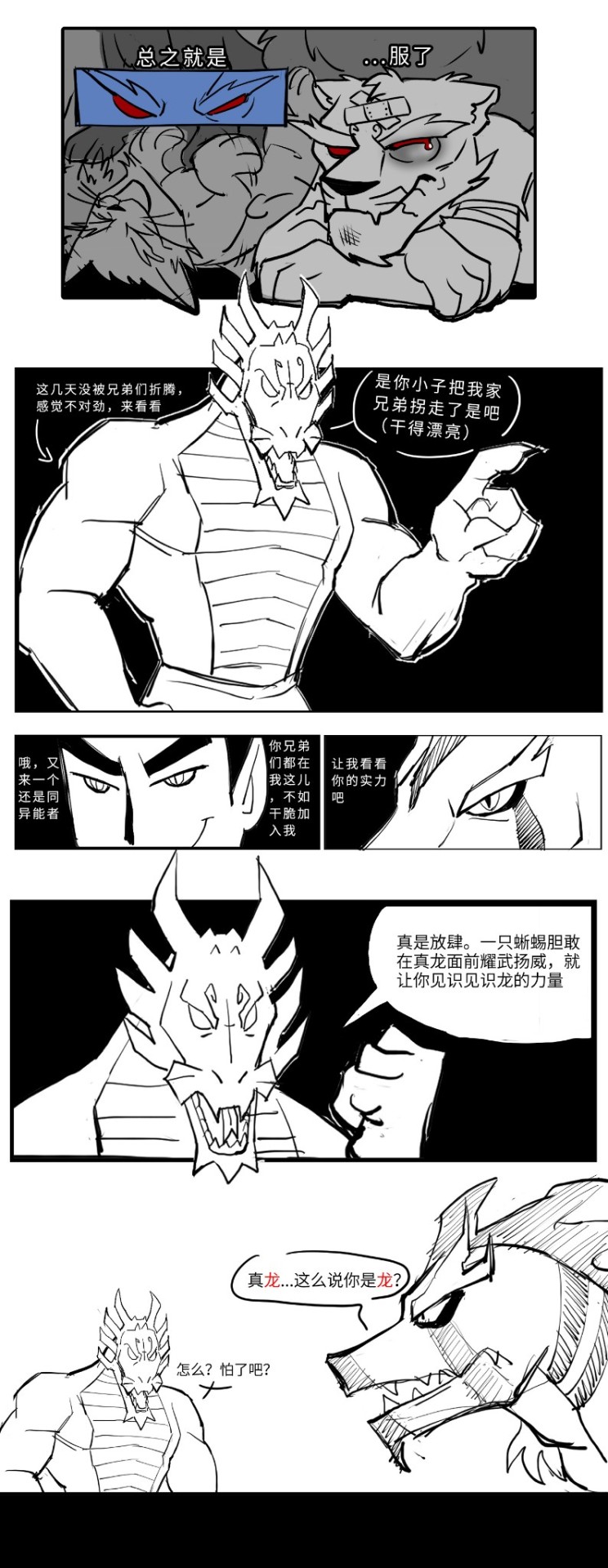
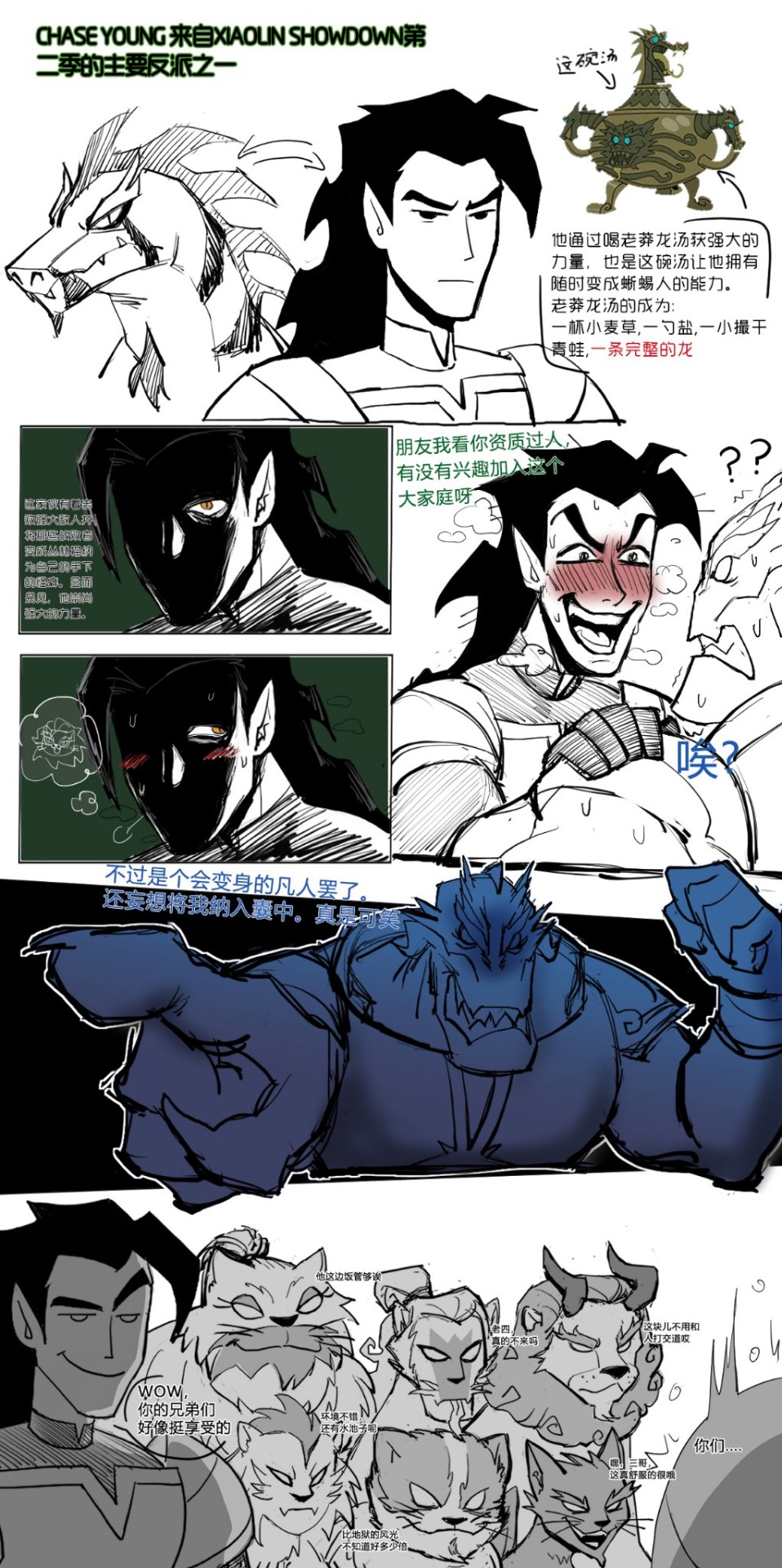

嗨朋友有没有兴趣了解一下xiaolin showdown_(:зゝ∠)_
#xiaolin showdown#chase young#jackie chan adventures#Bai Tza#Dai Gui#Hsi Wu#Po Kong#Tchang Zu#Tso Lan#Xiao Fung#Shendu#jca
66 notes
·
View notes
Text
Daily Selections From Lao-Tzu’s Tao Te Ching – March 23, 2024
“When the Tao is present in the world
courier horses manure fields instead of roads
when the Tao is absent from the world
war horses are raised on the border
no crime is worse than yielding to desire
no wrong is greater than discontent
no curse is crueler than getting what you want
the contentment of being content
is true contentment indeed”
-Lao-tzu-
(Taoteching, verse 46, translation by Red Pine)
HO-SHANG KUNG says, “‘When the Tao is present’ means when the world’s rulers possess the Tao. In ordering their countries, they don’t use weapons, and they send courier horses back to do farm work. And in ordering themselves, they redirect their yang essence to fertilize their bodies.”
YEN TSUN says, “The lives of the people depend on their ruler. And the position of the ruler depends on the people. When a ruler possesses the Tao, the people prosper. When a ruler loses the Tao, the people suffer.”
WANG PI says, “When the Tao is present, contentment reigns. People don’t seek external things but cultivate themselves instead. Courier horses are sent home to manure fields. When people don’t control their desires, when they don’t cultivate themselves but seek external things instead, cavalry horses are bred on the borders.”
WU CH’ENG says, “In ancient times, every district of sixty-four neighborhoods was required to provide a horse for the army.”
CHIAO HUNG says, “A ‘border’ refers to the land between two states. When war horses are raised on the border, it means soldiers have not been home for a long time.”
THE YENTIEHLUN SAYS, “It is said that long ago, before the wars with the Northern Hu and the Southern Yueh, taxes were low, and the people were well off. Their clothes were warm, and their larders were stocked. Cattle and horses grazed in herds. Farmers used horses to pull plows and carts. Nobody rode them. During this period, even the swiftest horses were used to manure fields. Later, when armies arose, there were never enough horses for the cavalry, and mares were used as well. Thus, colts were born on the battlefield” (15).
LI HSI-CHAI says, “When the ruler possess the Tao, soldiers become farmers. When the ruler does not possess the Tao, farmers become soldiers. Someone who understands the Tao turns form into emptiness. Someone who does not understand the Tao turns emptiness into form. To yield to desire means to want. Not to know contentment means to grasp. To get what you want means to possess. Want gives birth to grasping, and grasping gives birth to possessing and there is no end to possessing. But once we know that we do not need to grasp anything outside ourselves, we know contentment. And once we know contentment, there is nothing with which we are not content.”
LU HSI-SHENG says, “When the mind sees something desirable and wants it, even though it does not accord with reason – there is no worse crime. When want knows no limit, and it brings harm to others, there is no greater wrong. When every desire has to be satisfied, and the mind never stops burning, there is no crueler curse. We all have enough. When we are content with enough, we are content wherever we are.”
LU TUNG-PIN says, “To know contentment means the Tao prevails. Not to know contentment means the Tao fails. What we know comes from our minds, which Lao-tzu represents as a horse. When we know contentment, our horse stays home. When we don’t know contentment, it guards the border. When the Tao prevails, we put the whip away.”
HSUAN-TSUNG says, “Material contentment is not contentment. Spiritual contentment is true contentment.”
3 notes
·
View notes
Text
List of Gods, most of which are no longer worshipped. via /r/atheism
List of Gods, most of which are no longer worshipped.
Middle-East
A, Adad, Adapa, Adrammelech, Aeon, Agasaya, Aglibol, Ahriman, Ahura Mazda, Ahurani, Ai-ada, Al-Lat, Aja, Aka, Alalu, Al-Lat, Amm, Al-Uzza (El-'Ozza or Han-Uzzai), An, Anahita, Anath (Anat), Anatu, Anbay, Anshar, Anu, Anunitu, An-Zu, Apsu, Aqhat, Ararat, Arinna, Asherali, Ashnan, Ashtoreth, Ashur, Astarte, Atar, Athirat, Athtart, Attis, Aya, Baal (Bel), Baalat (Ba'Alat), Baau, Basamum, Beelsamin, Belit-Seri, Beruth, Borak, Broxa, Caelestis, Cassios, Lebanon, Antilebanon, and Brathy, Chaos, Chemosh, Cotys, Cybele, Daena, Daevas, Dagon, Damkina, Dazimus, Derketo, Dhat-Badan, Dilmun, Dumuzi (Du'uzu), Duttur, Ea, El, Endukugga, Enki, Enlil, Ennugi, Eriskegal, Ereshkigal (Allatu), Eshara, Eshmun, Firanak, Fravashi, Gatamdug, Genea, Genos, Gestinanna, Gula, Hadad, Hannahanna, Hatti, Hea, Hiribi, The Houri, Humban, Innana, Ishkur, Ishtar, Ithm, Jamshid or Jamshyd, Jehovah, Jesus, Kabta, Kadi, Kamrusepas, Ki (Kiki), Kingu, Kolpia, Kothar-u-Khasis, Lahar, Marduk, Mari, Meni, Merodach, Misor, Moloch, Mot, Mushdama, Mylitta, Naamah, Nabu (Nebo), Nairyosangha, Nammu, Namtaru, Nanna, Nebo, Nergal, Nidaba, Ninhursag or Nintu, Ninlil, Ninsar, Nintur, Ninurta, Pa, Qadshu, Rapithwin, Resheph (Mikal or Mekal), Rimmon, Sadarnuna, Shahar, Shalim, Shamish, Shapshu, Sheger, Sin, Siris (Sirah), Taautos, Tammuz, Tanit, Taru, Tasimmet, Telipinu, Tiamat, Tishtrya, Tsehub, Utnapishtim, Utu, Wurusemu, Yam, Yarih (Yarikh), Yima, Zaba, Zababa, Zam, Zanahary (Zanaharibe), Zarpandit, Zarathustra, Zatavu, Zazavavindrano, Ziusudra, Zu (Imdugud), Zurvan
China:
Ba, Caishen, Chang Fei, Chang Hsien, Chang Pan, Ch'ang Tsai, Chao san-Niang, Chao T'eng-k'ang, Chen Kao, Ch'eng Huang, Cheng San-Kung, Cheng Yuan-ho, Chi Po, Chien-Ti, Chih Jih, Chih Nii, Chih Nu, Ch'ih Sung-tzu, Ching Ling Tzu, Ch'ing Lung, Chin-hua Niang-niang, Chio Yuan-Tzu, Chou Wang, Chu Niao, Chu Ying, Chuang-Mu, Chu-jung, Chun T'i, Ch'ung Ling-yu, Chung Liu, Chung-kuei, Chung-li Ch'üan, Di Jun, Fan K'uei, Fei Lien, Feng Pho-Pho, Fengbo, Fu Hsing, Fu-Hsi, Fu-Pao, Gaomei, Guan Di, Hao Ch'iu, Heng-o, Ho Po (Ping-I), Hou Chi, Hou T'u, Hsi Ling-su, Hsi Shih, Hsi Wang Mu, Hsiao Wu, Hsieh T'ien-chun, Hsien Nung, Hsi-shen, Hsu Ch'ang, Hsuan Wen-hua, Huang Ti, Huang T'ing, Huo Pu, Hu-Shen, Jen An, Jizo Bosatsu, Keng Yen-cheng, King Wan, Ko Hsien-Weng, Kuan Ti, Kuan Ti, Kuei-ku Tzu, Kuo Tzu-i, Lai Cho, Lao Lang, Lei Kung, Lei Tsu, Li Lao-chun, Li Tien, Liu Meng, Liu Pei, Lo Shen, Lo Yu, Lo-Tsu Ta-Hsien, Lu Hsing, Lung Yen, Lu-pan, Ma-Ku, Mang Chin-i, Mang Shen, Mao Meng, Men Shen, Miao Hu, Mi-lo Fo, Ming Shang, Nan-chi Hsien-weng, Niu Wang, Nu Wa, Nu-kua, Pa, Pa Cha, Pai Chung, Pai Liu-Fang, Pai Yu, P'an Niang, P'an-Chin-Lien, Pao Yuan-ch'uan, Phan Ku, P'i Chia-Ma, Pien Ho, San Kuan, Sao-ch'ing Niang, Sarudahiko, Shang Chien, Shang Ti, She chi, Shen Hsui-Chih, Shen Nung, Sheng Mu, Shih Liang, Shiu Fang, Shou-lao, Shun I Fu-jen, Sien-Tsang, Ssu-ma Hsiang-ju, Sun Pin, Sun Ssu-miao, Sung-Chiang, Tan Chu, T'ang Ming Huang, Tao Kung, T'ien Fei, Tien Hou, Tien Mu, Ti-tsang, Tsai Shen, Ts'an Nu, Ts'ang Chien, Tsao Chun, Tsao-Wang, T'shai-Shen, Tung Chun, T'ung Chung-chung, T'ung Lai-yu, Tung Lu, T'ung Ming, Tzu-ku Shen, Wa, Wang Ta-hsien, Wang-Mu-Niang-Niang, Weiwobo, Wen-ch'ang, Wu-tai Yuan-shuai, Xi Hou, Xi Wangmu, Xiu Wenyin, Yanwang, Yaoji, Yen-lo, Yen-Lo-Wang, Yi, Yu, Yu Ch'iang, Yu Huang, Yun-T'ung, Yu-Tzu, Zaoshen, Zhang Xi, , Zhinü, , Zhongguei, , Zigu Shen, , Zisun, Ch'ang-O
Slavic:
Aba-khatun, Aigiarm, Ajysyt, Alkonost, Almoshi, Altan-Telgey, Ama, Anapel, As-ava, Ausaitis, Austeja, Ayt'ar, Baba Yaga (Jezi Baba), Belobog (Belun), Boldogasszony, Breksta, Bugady Musun, Chernobog (Crnobog, Czarnobog, Czerneboch, Cernobog), Cinei-new, Colleda (Koliada), Cuvto-ava, Dali, Darzu-mate, Dazhbog, Debena, Devana, Diiwica (Dilwica), Doda (Dodola), Dolya, Dragoni, Dugnai, Dunne Enin, Edji, Elena, Erce, Etugen, Falvara, The Fates, The Fatit, Gabija, Ganiklis, Giltine, Hotogov Mailgan, Hov-ava, Iarila, Isten, Ja-neb'a, Jedza, Joda-mate, Kaldas, Kaltes, Keretkun, Khadau, Khursun (Khors), Kostrubonko, Kovas, Krumine, Kupala, Kupalo, Laima, Leshy, Marina, Marzana, Matergabiae, Mat Syra Zemlya, Medeine, Menu (Menulis), Mir-Susne-Khum, Myesyats, Nastasija, (Russia) Goddess of sleep., Nelaima, Norov, Numi-Tarem, Nyia, Ora, Ot, Patollo, Patrimpas, Pereplut, Perkuno, Perun, Pikuolis, Pilnytis, Piluitus, Potrimpo, Puskaitis, Rod, Rugevit, Rultennin, Rusalki, Sakhadai-Noin, Saule, Semargl, Stribog, Sudjaje, Svantovit (Svantevit, Svitovyd), Svarazic (Svarozic, Svarogich), Tengri, Tñairgin, Triglav, Ulgen (Ulgan, Ülgön), Veles (Volos), Vesna, Xatel-Ekwa, Xoli-Kaltes, Yamm, Yarilo, Yarovit, Ynakhsyt, Zaria, Zeme mate, Zemyna, Ziva (Siva), Zizilia, Zonget, Zorya, Zvoruna, Zvezda Dennitsa, Zywie
Hindu
Aditi, Adityas, Ambika, Ananta (Shesha), Annapurna (Annapatni), Aruna, Ashvins, Balarama, Bhairavi, Brahma, Buddha, Dakini, Devi, Dharma, Dhisana, Durga, Dyaus, Ganesa (Ganesha), Ganga (Ganges), Garuda, Gauri, Gopis, Hanuman, Hari-Hara, Hulka Devi, Jagganath, Jyeshtha, Kama, Karttikeya, Krishna, Krtya, Kubera, Kubjika, Lakshmi or Laksmi, Manasha, Manu, Maya, Meru, Nagas, Nandi, Naraka, Nataraja, Nirriti, Parjanya, Parvati, Paurnamasi, Prithivi, Purusha, Radha, Rati, Ratri, Rudra, Sanjna, Sati, Shashti, Shatala, Sitala (Satala), Skanda, Sunrta, Surya, Svasti-devi, Tvashtar, Uma, Urjani, Vach, Varuna, Vayu, Vishnu (Avatars of Vishnu: Matsya; Kurma; Varaha; Narasinha; Vamana; Parasurama; Rama; Krishna; Buddha; Kalki), Vishvakarman, Yama, Sraddha
Japan: Aji-Suki-Taka-Hi-Kone, Ama no Uzume, Ama-terasu, Amatsu Mikaboshi, Benten (Benzai-Ten), Bishamon, Chimata-No-Kami, Chup-Kamui, Daikoku, Ebisu, Emma-O, Fudo, Fuji, Fukurokuju, Gekka-O, Hachiman, Hettsui-No-Kami, Ho-Masubi, Hotei, Inari, Izanagi and Izanami, Jizo Bosatsu, Jurojin, Kagutsuchi, Kamado-No-Kami, Kami, Kawa-No-Kami, Kaya-Nu-Hima, Kishijoten, Kishi-Mojin, Kunitokotatchi, Marici, Monju-Bosatsu, Nai-No-Kami, No-Il Ja-Dae, O-Kuni-Nushi, Omoigane, Raiden, Shine-Tsu-Hiko, Shoten, Susa-no-wo, Tajika-no-mikoto, Tsuki-yomi, Uka no Mitanna, Uke-mochi, Uso-dori, Uzume, Wakahirume, Yainato-Hnneno-Mikoi, Yama-No-Kami, Yama-no-Karni, Yaya-Zakurai, Yuki-Onne
India
Agni, Ammavaru, Asuras, Banka-Mundi, Brihaspati, Budhi Pallien, Candi, Challalamma, Chinnintamma, Devas, Dyaush, Gauri-Sankar, Grhadevi, Gujeswari, Indra, Kali, Lohasur Devi, Mayavel, Mitra, Prajapati, Puchan, Purandhi, Rakshas, Rudrani, Rumina, Samundra, Sarasvati, Savitar, Siva (Shiva), Soma, Sura, Surabhi, Tulsi, Ushas, Vata, Visvamitra, Vivasvat, Vritra, Waghai Devi, Yaparamma, Yayu, Zumiang Nui, Diti
Other Asian: Dewi Shri, Po Yan Dari, Shuzanghu, Antaboga, Yakushi Nyorai, Mulhalmoni, Tankun, Yondung Halmoni, Aryong Jong, Quan Yin , Tengri, Uminai-gami, Kamado-No-Kami, Kunitokotatchi, Giri Devi, Dewi Nawang Sasih, Brag-srin-mo, Samanta-Bhadra, Sangs-rgyas-mkhá, Sengdroma, Sgeg-mo-ma, Tho-og, Ui Tango, Yum-chen-mo, Zas-ster-ma-dmar-mo, Chandra, Dyaus, Ratri, Rodasi, Vayu, Au-Co
African Gods, Demigods and First Men:
Abassi , Abuk , Adu Ogyinae , Agé , Agwe , Aida Wedo , Ajalamo, Aje, Ajok, Akonadi, Akongo, Akuj, Amma, Anansi, Asase Yaa, Ashiakle, Atai , Ayaba, Aziri, Baatsi, Bayanni, Bele Alua, Bomo rambi, Bosumabla, Buk, Buku, Bumba, Bunzi, Buruku, Cagn, Candit, Cghene, Coti, Damballah-Wedo, Dan, Deng, Domfe, Dongo, Edinkira, Efé, Egungun-oya, Eka Abassi, Elephant Girl Mbombe, Emayian, Enekpe, En-Kai, Eseasar, Eshu, Esu, Fa, Faran, Faro, Fatouma, Fidi Mukullu, Fon, Gleti, Gonzuole, Gû, Gua, Gulu, Gunab, Hammadi, Hêbiesso, Iku, Ilankaka, Imana, Iruwa, Isaywa, Juok, Kazooba, Khakaba, Khonvum, Kibuka, Kintu, Lebé, Leza, Libanza, Lituolone, Loko, Marwe, Massim Biambe, Mawu-Lisa (Leza), Mboze, Mebeli, Minepa, Moombi, Mukameiguru, Mukasa, Muluku, Mulungu, Mwambu, Nai, Nambi, Nana Buluku, Nanan-Bouclou, Nenaunir, Ng Ai, Nyaliep, Nyambé, Nyankopon, Nyasaye, Nzame, Oboto, Obumo, Odudua-Orishala, Ogun, Olokun, Olorun, Orisha Nla, Orunmila, Osanyin, Oshe, Osun, Oya, Phebele, Pokot-Suk, Ralubumbha, Rugaba, Ruhanga, Ryangombe, Sagbata, Shagpona, Shango, Sopona, Tano, Thixo, Tilo, Tokoloshi, Tsui, Tsui'goab, Umvelinqangi, Unkulunkulu, Utixo, Wak, Wamara, Wantu Su, Wele, Were, Woto, Xevioso, Yangombi, Yemonja, Ymoa, Ymoja, Yoruba, Zambi, Zanahary , Zinkibaru
Australian Gods, Goddesses and Places in the Dreamtime:
Alinga, Anjea, Apunga, Arahuta, Ariki, Arohirohi, Bamapana, Banaitja, Bara, Barraiya, Biame, Bila, Boaliri, Bobbi-bobbi, Bunbulama, Bunjil, Cunnembeille, Daramulum, Dilga, Djanggawul Sisters, Eingana, Erathipa, Gidja , Gnowee, Haumia, Hine Titama, Ingridi, Julana, Julunggul, Junkgowa, Karora, Kunapipi-Kalwadi-Kadjara, Lia, Madalait, Makara, Nabudi, Palpinkalare, Papa, Rangi, Rongo, Tane, Tangaroa, Tawhiri-ma-tea, Tomituka, Tu, Ungamilia, Walo, Waramurungundi, Wati Kutjarra, Wawalag Sisters, Wuluwaid, Wuragag, Wuriupranili, Wurrunna, Yhi
Buddhism, Gods and Relatives of God:
Aizen-Myoo, Ajima,Dai-itoku-Myoo, Fudo-Myoo, Gozanze-Myoo, Gundari-Myoo, Hariti, Kongo-Myoo, Kujaku-Myoo, Ni-O
Carribean: Gods, Monsters and Vodun Spirits
Agaman Nibo , Agwe, Agweta, Ah Uaynih, Aida Wedo , Atabei , Ayida , Ayizan, Azacca, Baron Samedi, Ulrich, Ellegua, Ogun, Ochosi, Chango, Itaba, Amelia, Christalline, Clairmé, Clairmeziné, Coatrischie, Damballah , Emanjah, Erzuli, Erzulie, Ezili, Ghede, Guabancex, Guabonito, Guamaonocon, Imanje, Karous, Laloue-diji, Legba, Loa, Loco, Maitresse Amelia , Mapiangueh, Marie-aimée, Marinette, Mombu, Marassa, Nana Buruku, Oba, Obtala, Ochu, Ochumare, Oddudua, Ogoun, Olokum, Olosa, Oshun, Oya, Philomena, Sirêne, The Diablesse, Itaba, Tsilah, Ursule, Vierge, Yemaya , Zaka
Celtic: Gods, Goddesses, Divine Kings and Pagan Saints
Abarta, Abna, Abnoba, Aine, Airetech,Akonadi, Amaethon, Ameathon, An Cailleach, Andraste, Antenociticus, Aranrhod, Arawn, Arianrod, Artio, Badb,Balor, Banbha, Becuma, Belatucadros, Belatu-Cadros, Belenus, Beli,Belimawr, Belinus, Bendigeidfran, Bile, Blathnat, Blodeuwedd, Boann, Bodus,Bormanus, Borvo, Bran, Branwen, Bres, Brigid, Brigit, Caridwen, Carpantus,Cathbadh, Cecht, Cernach, Cernunnos, Cliodna, Cocidius, Conchobar, Condatis, Cormac,Coronus,Cosunea, Coventina, Crarus,Creidhne, Creirwy, Cu Chulainn, Cu roi, Cuda, Cuill,Cyhiraeth,Dagda, Damona, Dana, Danu, D'Aulnoy,Dea Artio, Deirdre , Dewi, Dian, Diancecht, Dis Pater, Donn, Dwyn, Dylan, Dywel,Efnisien, Elatha, Epona, Eriu, Esos, Esus, Eurymedon,Fedelma, Fergus, Finn, Fodla, Goewyn, Gog, Goibhniu, Govannon , Grainne, Greine,Gwydion, Gwynn ap Nudd, Herne, Hu'Gadarn, Keltoi,Keridwen, Kernunnos,Ler, Lir, Lleu Llaw Gyffes, Lludd, Llyr, Llywy, Luchta, Lug, Lugh,Lugus, Mabinogion,Mabon, Mac Da Tho, Macha, Magog, Manannan, Manawydan, Maponos, Math, Math Ap Mathonwy, Medb, Moccos,Modron, Mogons, Morrig, Morrigan, Nabon,Nantosuelta, Naoise, Nechtan, Nedoledius,Nehalennia, Nemhain, Net,Nisien, Nodens, Noisi, Nuada, Nwywre,Oengus, Ogma, Ogmios, Oisin, Pach,Partholon, Penard Dun, Pryderi, Pwyll, Rhiannon, Rosmerta, Samhain, Segidaiacus, Sirona, Sucellus, Sulis, Taliesin, Taranis, Teutates, The Horned One,The Hunt, Treveni,Tyne, Urien, Ursula of the Silver Host, Vellaunus, Vitiris, White Lady
Egyptian: Gods, Gods Incarnate and Personified Divine Forces:
Amaunet, Amen, Amon, Amun, Anat, Anqet, Antaios, Anubis, Anuket, Apep, Apis, Astarte, Aten, Aton, Atum, Bastet, Bat, Buto, Duamutef, Duamutef, Hapi, Har-pa-khered, Hathor, Hauhet, Heket, Horus, Huh, Imset, Isis, Kauket, Kebechsenef, Khensu, Khepri, Khnemu, Khnum, Khonsu, Kuk, Maahes, Ma'at, Mehen, Meretseger, Min, Mnewer, Mut, Naunet, Nefertem, Neith, Nekhbet, Nephthys, Nun, Nut, Osiris, Ptah, Ra , Re, Renenet, Sakhmet, Satet, Seb, Seker, Sekhmet, Serapis, Serket, Set, Seth, Shai, Shu, Shu, Sia, Sobek, Sokar, Tefnut, Tem, Thoth
Hellenes (Greek) Tradition (Gods, Demigods, Divine Bastards)
Acidalia, Aello, Aesculapius, Agathe, Agdistis, Ageleia, Aglauros, Agne, Agoraia, Agreia, Agreie, Agreiphontes, Agreus, Agrios, Agrotera, Aguieus, Aidoneus, Aigiokhos, Aigletes, Aigobolos, Ainia,Ainippe, Aithuia , Akesios, Akraia, Aktaios, Alalkomene, Alasiotas, Alcibie, Alcinoe, Alcippe, Alcis,Alea, Alexikakos, Aligena, Aliterios, Alkaia, Amaltheia, Ambidexter, Ambologera, Amynomene,Anaduomene, Anaea, Anax, Anaxilea, Androdameia,Andromache, Andromeda, Androphonos, Anosia, Antandre,Antania, Antheus, Anthroporraistes, Antianara, Antianeira, Antibrote, Antimache, Antimachos, Antiope,Antiopeia, Aoide, Apatouria, Aphneius, Aphrodite, Apollo, Apotropaios, Areia, Areia, Areion, Areopagite, Ares, Areto, Areximacha,Argus, Aridnus,Aristaios, Aristomache, Arkhegetes, Arktos, Arretos, Arsenothelys, Artemis, Asclepius, Asklepios, Aspheleios, Asteria, Astraeos , Athene, Auxites, Avaris, Axios, Axios Tauros,Bakcheios, Bakchos, Basileus, Basilis, Bassareus, Bauros, Boophis, Boreas , Botryophoros, Boukeros, Boulaia, Boulaios, Bremusa,Bromios, Byblis,Bythios, Caliope, Cedreatis, Celaneo, centaur, Cerberus, Charidotes, Charybdis, Chimera, Chloe, Chloris , Choreutes, Choroplekes, Chthonios, Clete, Clio, clotho,Clyemne, cockatrice, Crataeis, Custos, Cybebe, Cybele, Cyclops, Daphnaia, Daphnephoros, Deianeira, Deinomache, Delia, Delios, Delphic, Delphinios, Demeter, Dendrites, Derimacheia,Derinoe, Despoina, Dikerotes, Dimeter, Dimorphos, Dindymene, Dioktoros, Dionysos, Discordia, Dissotokos, Dithyrambos, Doris, Dryope,Echephyle,Echidna, Eiraphiotes, Ekstatophoros, Eleemon, Eleuthereus, Eleutherios, Ennosigaios, Enodia, Enodios, Enoplios, Enorches, Enualios, Eos , Epaine, Epidotes, Epikourios, Epipontia, Epitragidia, Epitumbidia, Erato, Ergane, Eribromios, Erigdoupos, Erinus, Eriobea, Eriounios, Eriphos, Eris, Eros,Euanthes, Euaster, Eubouleus, Euboulos, Euios, Eukhaitos, Eukleia, Eukles, Eumache, Eunemos, Euplois, Euros , Eurybe,Euryleia, Euterpe, Fates,Fortuna, Gaia, Gaieokhos, Galea, Gamelia, Gamelios, Gamostolos, Genetor, Genetullis, Geryon, Gethosynos, giants, Gigantophonos, Glaukopis, Gorgons, Gorgopis, Graiae, griffin, Gynaikothoinas, Gynnis, Hagisilaos, Hagnos, Haides, Harmothoe, harpy, Hegemone, Hegemonios, Hekate, Hekatos, Helios, Hellotis, Hephaistia, Hephaistos, Hera, Heraios, Herakles, Herkeios, Hermes, Heros Theos, Hersos, Hestia, Heteira, Hiksios, Hipp, Hippia, Hippios, Hippoi Athanatoi, Hippolyte, Hippolyte II,Hippomache,Hippothoe, Horkos, Hugieia, Hupatos, Hydra, Hypate, Hyperborean, Hypsipyle, Hypsistos, Iakchos, Iatros, Idaia, Invictus, Iphito,Ismenios, Ismenus,Itonia, Kabeiria, Kabeiroi, Kakia, Kallinikos, Kallipugos, Kallisti, Kappotas, Karneios, Karpophoros, Karytis, Kataibates, Katakhthonios, Kathatsios, Keladeine, Keraunos, Kerykes, Khalinitis, Khalkioikos, Kharmon, Khera, Khloe, Khlori,Khloris,Khruse, Khthonia, Khthonios, Kidaria, Kissobryos, Kissokomes, Kissos, Kitharodos, Kleidouchos, Kleoptoleme, Klymenos, Kore, Koruthalia, Korymbophoros, Kourotrophos, Kranaia, Kranaios, Krataiis, Kreousa, Kretogenes, Kriophoros, Kronides, Kronos,Kryphios, Ktesios, Kubebe, Kupris, Kuprogenes, Kurotrophos, Kuthereia, Kybele, Kydoime,Kynthia, Kyrios, Ladon, Lakinia, Lamia, Lampter, Laodoke, Laphria, Lenaios, Leukatas, Leukatas, Leukolenos, Leukophruene, Liknites, Limenia, Limnaios, Limnatis, Logios, Lokhia, Lousia, Loxias, Lukaios, Lukeios, Lyaios, Lygodesma, Lykopis, Lyseus, Lysippe, Maimaktes, Mainomenos, Majestas, Makar, Maleatas, Manikos, Mantis, Marpe, Marpesia, Medusa, Megale, Meilikhios, Melaina, Melainis, Melanaigis, Melanippe,Melete, Melousa, Melpomene, Melqart, Meses, Mimnousa, Minotaur, Mneme, Molpadia,Monogenes, Morpho, Morychos, Musagates, Musagetes, Nebrodes, Nephelegereta, Nereus,Nete, Nike, Nikephoros, Nomios, Nomius, Notos , Nyktelios, Nyktipolos, Nympheuomene, Nysios, Oiketor, Okyale, Okypous, Olumpios, Omadios, Ombrios, Orithia,Orius,Ortheia, Orthos, Ourania, Ourios, Paelemona, Paian, Pais, Palaios, Pallas, Pan Megas, Panakhais, Pandemos, Pandrosos, Pantariste, Parthenos, PAsianax, Pasiphaessa, Pater, Pater, Patroo s, Pegasus, Pelagia, Penthesilea, Perikionios, Persephone, Petraios, Phanes, Phanter, Phatria, Philios, Philippis, Philomeides, Phoebe, Phoebus, Phoenix, Phoibos, Phosphoros, Phratrios, Phutalmios, Physis, Pisto, Plouton, Polemusa,Poliakhos, Polias, Polieus, Polumetis, Polydektes, Polygethes, Polymnia, Polymorphos, Polyonomos, Porne, Poseidon, Potnia Khaos, Potnia Pheron, Promakhos, Pronoia, Propulaios, Propylaia, Proserpine, Prothoe, Protogonos, Prytaneia, Psychopompos, Puronia, Puthios, Pyrgomache, Python, Rhea, Sabazios, Salpinx, satyr, Saxanus, Scyleia,Scylla, sirens, Skeptouchos, Smintheus, Sophia, Sosipolis, Soter, Soteria, Sphinx, Staphylos, Sthenias, Sthenios, Strife, Summakhia, Sykites, Syzygia, Tallaios, Taureos, Taurokeros, Taurophagos, Tauropolos, Tauropon, Tecmessa, Teisipyte, Teleios, Telepyleia,Teletarches, Terpsichore, Thalestris, Thalia, The Dioskouroi, Theos, Theritas, Thermodosa, Thraso, Thyonidas, Thyrsophoros, Tmolene, Toxaris, Toxis, Toxophile,Trevia, Tricephalus, Trieterikos, Trigonos, Trismegestos, Tritogeneia, Tropaios, Trophonius,Tumborukhos, Tyche, Typhon, Urania, Valasca, Xanthippe, Xenios, Zagreus, Zathos, Zephryos , Zeus, Zeus Katakhthonios, Zoophoros Topana
Native American: Gods, Heroes, and Anthropomorphized Facets of Nature
Aakuluujjusi, Ab Kin zoc, Abaangui , Ababinili , Ac Yanto, Acan, Acat, Achiyalatopa , Acna, Acolmiztli, Acolnahuacatl, Acuecucyoticihuati, Adamisil Wedo, Adaox , Adekagagwaa , Adlet , Adlivun, Agloolik , Aguara , Ah Bolom Tzacab, Ah Cancum, Ah Chun Caan, Ah Chuy Kak, Ah Ciliz, Ah Cun Can, Ah Cuxtal, Ah hulneb, Ah Kin, Ah Kumix Uinicob, Ah Mun, Ah Muzencab, Ah Patnar Uinicob, Ah Peku, Ah Puch, Ah Tabai, Ah UincirDz'acab, Ah Uuc Ticab, Ah Wink-ir Masa, Ahau Chamahez, Ahau-Kin, Ahmakiq, Ahnt Alis Pok', Ahnt Kai', Aholi , Ahsonnutli , Ahuic, Ahulane, Aiauh, Aipaloovik , Ajbit, Ajilee , Ajtzak, Akbaalia , Akba-atatdia , Akhlut , Akhushtal, Akna , Akycha, Alaghom Naom Tzentel, Albino Spirit animals , Alektca , Alignak, Allanque , Allowat Sakima , Alom, Alowatsakima , Amaguq , Amala , Amimitl, Amitolane, Amotken , Andaokut , Andiciopec , Anerneq , Anetlacualtiliztli, Angalkuq , Angpetu Wi, Anguta, Angwusnasomtaka , Ani Hyuntikwalaski , Animal spirits , Aningan, Aniwye , Anog Ite , Anpao, Apanuugak , Apicilnic , Apikunni , Apotamkin , Apoyan Tachi , Apozanolotl, Apu Punchau, Aqalax , Arendiwane , Arnakua'gsak , Asdiwal , Asgaya Gigagei, Asiaq , Asin , Asintmah, Atacokai , Atahensic, Aticpac Calqui Cihuatl, Atira, Atisokan , Atius Tirawa , Atl, Atlacamani, Atlacoya, Atlatonin, Atlaua, Atshen , Auilix, Aulanerk , Aumanil , Aunggaak , Aunt Nancy , Awaeh Yegendji , Awakkule , Awitelin Tsta , Awonawilona, Ayauhteotl, Azeban, Baaxpee , Bacabs, Backlum Chaam, Bagucks , Bakbakwalanooksiwae , Balam, Baldhead , Basamacha , Basket Woman , Bead Spitter , Bear , Bear Medicine Woman , Bear Woman , Beaver , Beaver Doctor , Big Heads, Big Man Eater , Big Tail , Big Twisted Flute , Bikeh hozho, Bitol, Black Hactcin , Black Tamanous , Blind Boy , Blind Man , Blood Clot Boy , Bloody Hand , Blue-Jay , Bmola , Bolontiku, Breathmaker, Buffalo , Buluc Chabtan, Burnt Belly , Burnt Face , Butterfly , Cabaguil, Cacoch, Cajolom, Cakulha, Camaxtli, Camozotz, Cannibal Grandmother , Cannibal Woman , Canotila , Capa , Caprakan, Ca-the-ña, Cauac, Centeotl, Centzonuitznaua, Cetan , Chac Uayab Xoc, Chac, Chahnameed , Chakwaina Okya, Chalchihuitlicue, Chalchiuhtlatonal, Chalchiutotolin, Chalmecacihuilt, Chalmecatl, Chamer, Changing Bear Woman , Changing Woman , Chantico, Chaob, Charred Body , Chepi , Chibiabos ,Chibirias, Chiccan, Chicomecoatl, Chicomexochtli, Chiconahui, Chiconahuiehecatl, Chie, Child-Born-in-Jug , Chirakan, Chulyen , Cihuacoatl, Cin-an-ev , Cinteotl, Cipactli, Cirapé , Cit Chac Coh, Cit-Bolon-Tum, Citlalatonac, Citlalicue, Ciucoatl, Ciuteoteo, Cizin, Cliff ogre , Coatlicue, Cochimetl, Cocijo, Colel Cab, Colop U Uichkin, Copil, Coyolxauhqui, Coyopa, Coyote , Cripple Boy , Crow , Crow Woman , Cum hau, Cunawabi , Dagwanoenyent , Dahdahwat , Daldal , Deohako, Dhol , Diyin dine , Djien , Djigonasee , Dohkwibuhch , Dzalarhons , Dzalarhons, Eagentci , Eagle , Earth Shaman , Eeyeekalduk , Ehecatl, Ehlaumel , Eithinoha , Ekchuah, Enumclaw , Eototo, Esaugetuh Emissee , Esceheman, Eschetewuarha, Estanatlehi , Estasanatlehi , Estsanatlehi, Evaki, Evening Star, Ewah , Ewauna, Face , Faces of the Forests , False Faces , Famine , Fastachee , Fire Dogs , First Creator , First Man and First Woman, First Scolder , Flint Man , Flood , Flower Woman , Foot Stuck Child , Ga'an, Ga-gaah , Gahe, Galokwudzuwis , Gaoh, Gawaunduk, Geezhigo-Quae, Gendenwitha, Genetaska, Ghanan, Gitche Manitou, Glispa, Glooskap , Gluscabi , Gluskab , Gluskap, Godasiyo, Gohone , Great Seahouse, Greenmantle , Gucumatz, Gukumatz, Gunnodoyak, Gyhldeptis, Ha Wen Neyu , Hacauitz , Hacha'kyum, Hagondes , Hahgwehdiyu , Hamatsa , Hamedicu, Hanghepi Wi, Hantceiitehi , Haokah , Hastseoltoi, Hastshehogan , He'mask.as , Hen, Heyoka , Hiawatha , Hino, Hisakitaimisi, Hokhokw , Hotoru, Huehuecoyotl, Huehueteotl, Huitaca , Huitzilopochtli, Huixtocihuatl, Hummingbird, Hun hunahpu, Hun Pic Tok, Hunab Ku, Hunahpu Utiu, Hunahpu, Hunahpu-Gutch, Hunhau, Hurakan, Iatiku And Nautsiti, Ich-kanava , Ictinike , Idliragijenget , Idlirvirisong, Igaluk , Ignirtoq , Ikanam , Iktomi , Ilamatecuhtli, Illapa, Ilya p'a, i'noGo tied , Inti, Inua , Ioskeha , Ipalnemohuani, Isakakate, Ishigaq , Isitoq , Issitoq , Ite , Itzamná, Itzananohk`u, Itzlacoliuhque, Itzli, Itzpapalotl, Ix Chebel Yax, Ixbalanque, Ixchel, Ixchup, Ixmucane, Ixpiyacoc, Ixtab, Ixtlilton, Ixtubtin, Ixzaluoh, Iya , Iyatiku , Iztaccihuatl, Iztacmixcohuatl, Jaguar Night, Jaguar Quitze, Jogah , Kaakwha , Kabun , Kabun , Kachinas, Kadlu , Ka-Ha-Si , Ka-Ha-Si , Kaik , Kaiti , Kan, Kana'ti and Selu , Kanati, Kan-u-Uayeyab, Kan-xib-yui, Kapoonis , Katsinas, Keelut , Ketchimanetowa, Ketq Skwaye, Kianto, Kigatilik , Kilya, K'in, Kinich Ahau, Kinich Kakmo, Kishelemukong , Kisin, Kitcki Manitou, Kmukamch , Kokopelli , Ko'lok , Kukulcan, Kushapatshikan , Kutni , Kutya'I , Kwakwakalanooksiwae ,Kwatee , Kwekwaxa'we , Kwikumat , Kyoi , Lagua , Land Otter People , Lawalawa , Logobola , Loha, Lone Man , Long Nose , Loon , Loon Medicine , Loon Woman , Loo-wit, Macaw Woman, Macuilxochitl, Maho Peneta, Mahucutah, Makenaima , Malesk , Malina , Malinalxochi, Malsum, Malsumis , Mam, Mama Cocha, Man in moon , Manabozho , Manetuwak , Mani'to, Manitou , Mannegishi , Manu, Masaya, Masewi , Master of Life , Master Of Winds, Matshishkapeu , Mavutsinim , Mayahuel, Medeoulin , Mekala , Menahka, Meteinuwak , Metztli, Mexitl, Michabo, Mictecacihuatl, Mictlan, Mictlantecuhtli, Mikchich , Mikumwesu , Mitnal, Mixcoatl, Mongwi Kachinum , Morning Star, Motho and Mungo , Mulac, Muut , Muyingwa , Nacon, Nagenatzani, Nagi Tanka , Nagual, Nahual, Nakawé, Nanabojo, Nanabozho , Nanabush, Nanahuatzin, Nanautzin, Nanih Waiya, Nankil'slas , Nanook , Naum, Negafook , Nerrivik , Nesaru, Nianque , Nishanu , Nohochacyum, Nokomis, Nootaikok , North Star, Nujalik , Nukatem , Nunne Chaha , Ocasta, Ockabewis, Odzihozo , Ohtas , Oklatabashih, Old Man , Olelbis, Omacatl, Omecihuatl, Ometecuhtli, Onatha , One Tail of Clear Hair , Oonawieh Unggi , Opochtli, Oshadagea, Owl Woman , Pah , Pah, Paiowa, Pakrokitat , Pana , Patecatl, Pautiwa, Paynal, Pemtemweha , Piasa , Pikváhahirak , Pinga , Pomola , Pot-tilter , Prairie Falcon , Ptehehincalasanwin , Pukkeenegak , Qaholom, Qakma, Qiqirn , Quaoar , Quetzalcoatl, Qumu , Quootis-hooi, Rabbit, Ragno, Raven, Raw Gums , Rukko, Sagamores , Sagapgia , Sanopi , Saynday , Sedna, Selu, Shakuru, Sharkura, Shilup Chito Osh, Shrimp house, Sila , Sint Holo , Sio humis, Sisiutl , Skan , Snallygaster , Sosondowah , South Star, Spider Woman , Sta-au , Stonecoats , Sun, Sungrey , Ta Tanka , Tabaldak , Taime , Taiowa , Talocan, Tans , Taqwus , Tarhuhyiawahku, Tarquiup Inua , Tate , Tawa, Tawiscara, Ta'xet , Tcisaki , Tecciztecatl, Tekkeitserktock, Tekkeitsertok , Telmekic , Teoyaomqui, Tepeu, Tepeyollotl, Teteoinnan, Tezcatlipoca, Thobadestchin, Thoume', Thunder , Thunder Bird , Tieholtsodi, Tihtipihin , Tirawa , Tirawa Atius, Tlacolotl, Tlahuixcalpantecuhtli, Tlaloc, Tlaltecuhtli, Tlauixcalpantecuhtli, Tlazolteotl, Tohil, Tokpela ,Tonantzin , Tonatiuh, To'nenile, Tonenili , Tootega , Torngasak, Torngasoak , Trickster/Transformer , True jaguar, Tsentsa, Tsichtinako, Tsohanoai Tsonoqwa , Tsul 'Kalu , Tulugaak , Tumas , Tunkan ingan, Turquoise Boy , Twin Thunder Boys, Txamsem , Tzakol, Tzitzimime, Uazzale , Uchtsiti, Udó , Uentshukumishiteu , Ueuecoyotl, Ugly Way , Ugni , Uhepono , Uitzilopochtli, Ukat , Underwater Panthers , Unhcegila , Unipkaat , Unk, Unktomi , Untunktahe , Urcaguary, Utea , Uwashil , Vassagijik , Voltan, Wabosso , Wabun , Wachabe, Wah-Kah-Nee, Wakan , Wakanda , Wakan-Tanka, Wakinyan , Wan niomi , Wanagi , Wananikwe , Watavinewa , Water babies , Waukheon , We-gyet , Wemicus , Wendigo , Wentshukumishiteu , White Buffalo Woman, Whope , Wi , Wicahmunga , Wihmunga , Windigo, Winonah, Wisagatcak , Wisagatcak, Wishpoosh , Wiyot , Wovoka , Wuya , Xaman Ek, Xelas , Xibalba, Xilonen, Xipe Totec, Xiuhcoatl, Xiuhtecuhtli, Xiuhtecutli, Xmucane, Xochipili , Xochiquetzal, Xocotl, Xolotl, Xpiyacoc, Xpuch And Xtah, Yacatecuhtli, Yaluk, Yanauluha , Ya-o-gah , Yeba Ka, Yebaad, Yehl , Yeitso, Yiacatecuhtli, Yolkai Estsan, Yoskeha , Yum Kaax, Yuwipi , Zaramama, Zipaltonal, Zotz
Norse Deities, Giants and Monsters:
Aegir, Aesir, Alfrigg, Audumbla, Aurgelmir, Balder, Berchta, Bergelmir, Bor, Bragi, Brisings, Buri, Etin, Fenris, Forseti, Frey, Freyja, Frigga, Gefion, Gerda, Gode, Gymir, Harke, Heimdall, Hel, Hermod, Hodur, Holda, Holle, Honir, Hymir, Idun, Jormungandr, Ljolsalfs, Loki, Magni, Mimir, Mistarblindi, Muspel, Nanna, Nanni, Nerthus, Njord, Norns, Odin, Perchta, Ran, Rig, Segyn, Sif, Skadi, Skirnir, Skuld, Sleipnir, Surt, Svadilfari, tanngniotr, tanngrisnr, Thiassi, Thor, Thrud, Thrudgelmir, Thrym, Thurs, Tyr, Uller, Urd, Vali, Vali, Valkyries, Vanir, Ve, Verdandi, Vidar, Wode, Ymir
Pacific islands: Deities, Demigods and Immortal Monsters:
Abeguwo, Abere, Adaro, Afekan, Ai Tupua'i, 'Aiaru, Ala Muki, Alalahe, Alii Menehune, Aluluei, Aruaka, Asin, Atanea, Audjal, Aumakua, Babamik, Bakoa, Barong, Batara Kala, Buring Une, Darago, Dayang-Raca, De Ai, Dogai, Enda Semangko, Faumea, Giriputri, Goga, Haumea, Hiiaka', Hina, Hine, Hoa-Tapu, 'Imoa, Io, Kanaloa, Kanaloa, Kane, Kapo, Kava, Konori, Ku, Kuhuluhulumanu, Kuklikimoku, Kukoae, Ku'ula, Laka, Laulaati, Lono, Mahiuki, MakeMake, Marruni, Maru, Maui, Melu, Menehune, Moeuhane, MOO-LAU, Ndauthina, Ne Te-reere, Nevinbimbaau, Ngendei, Nobu, Oro, Ove, Paka'a, Papa, Pele, Quat, Rangi, Rati, Rati-mbati-ndua, Ratu-Mai-Mbula, Rua, Ruahatu, Saning Sri, Ta'aroa, Taaroa, Tamakaia, Tane, Tanemahuta, Tangaroa, Tawhaki, Tiki, Tinirau, Tu, Tuli, Turi-a-faumea, Uira, Ukupanipo, Ulupoka, Umboko Indra, Vanuatu, Wahini-Hal, Walutahanga, Wari-Ma-Te-Takere, Whaitiri, Whatu, Wigan
South American: Deities, Demigods, Beings of Divine Substance:
Abaangui, Aclla, Akewa, Asima Si, Atoja, Auchimalgen, Axomama, Bachué, Beru, Bochica, Boiuna, Calounger, Catequil, Cavillaca, Ceiuci, Chasca, Chie, Cocomama, Gaumansuri, Huitaca, Iae, Ilyap'a, Ina, Inti, Ituana, Jamaina , Jandira, Jarina, Jubbu-jang-sangne, Ka-ata-killa, Kilya, Kuat, Kun, Luandinha, Lupi, Mama Allpa, Mama Quilla, Mamacocha, Manco Capac, Maret-Jikky, Maretkhmakniam, Mariana, Oshossi, Pachamac, Pachamama, Perimbó, Rainha Barba, Si, Supai, Topétine, Viracocha, Yemanja (Imanje), Zume
Submitted May 28, 2023 at 04:42PM by dreamer100__
(From Reddit https://ift.tt/uTlQcN4)
11 notes
·
View notes
Text
Never trust a demon
Especially if they’re from Jackie Chan Adventures
In Season One, Valmont provides the statuesque Shendu with all twelve of his talismans (which Jackie Chan stole at Valmont’s behest) and thus frees him from his petrification. Once free however, Shendu reneges on their previously agreement and refuses to provide Valmont with the lost treasure of Ching Xi Hung.
“Regrettably, Valmont, you did not provide me with the talismans. Jackie Chan did.”
Shendu justifies this reneger through a minor technicality that has no validity-that it was Jackie that obtained the talismans and not Valmont’s men. A ludicrous distinction, seeing as Chan was in Valmont’s employ at the time and was acting as his agent as much as Finn, Ratso or Chow were. This is clearly a pretext to refuse Valmont his rightful reward, indicating that Shendu never planned to give Valmont a single coin. Incidentally, by doing this, Shendu has much in common with another fictional dragon, who’s name shall not be mentioned here.
This first act of betrayal sets the tone for the dishonouring of demonic promises in the series. Ironically enough, the next person to suffer from the reneger of a demonic promise is Shendu himself.
After being destroyed by Jade Chan and being consigned to the Netherworld as a spirit, Shendu is at the mercy of his vengeful siblings. He only manages to forestall their wrath by promising to free them from their prison. While the seven siblings agree, they devise a contingency which traps Shendu within the first mortal he possesses, promising to free him only after he opens all seven of their portals.
Fast forward to several months later, when Shendu and his minions open the seventh and final demon portal in Rome. Only to be flatly denied his release by his sister, despite the previous agreement.
Po Kong, Xiao Fung, Tchang Zu, Dai Gui, His Wu, Tso Lan and finally Bai Tsa were all released from the Netherworld by the efforts of their disembodied brother. And every one of those demons, through no fault of Shendu’s, found themselves banished once more within hours or days of their release.
Po Kong never even managed to leave the courtyard where she was released, before the elder Chan’s spell sent her right back to the Netherworld. Xiao Fung never left the prison walls into which he was freed before being sent back to the void. Tchang Zu wreaked havoc in Hollywood for a couple hours before being cast back into his portal. Dai Gui rampaged around Spain for less than a day before being exiled once more. Hsi Wu was the exception to his siblings in that he was able to stay free for a couple days, before sharing their fates. Tso Lan spent perhaps an hour outside the Netherworld before being whisked back. Bai Tsa was the smartest of the lot and managed to outmaneuver the Chans twice, but eventually was also hunted down and banished again.
All these demons squandered their brief freedom by blundering around the mortal world, blind to any dangers that existed to them-namely Uncle Chan and his chi spells, overwhelmingly arrogant in their own power. By the time Bai Tsa emerged from her portal in Spain, the other six demon sorcerers had been freed by their brother and reimprisoned just as quickly.
All six demons were furious at the abbreviated nature of their short-lived freedom, but they had no one but themselves to blame for their return to the pit. Had they acted differently, found a stronghold to hide in and built up their knowledge and strength, they could have survived and prospered in the modern world. As it was, they blundered around, drunk on their own power and found that their strength and magic did nothing to prevent their banishment.
Having learned nothing from centuries of incarceration, the six re-imprisoned demons blamed others for their lack of freedom as did their yet-to be freed sister. Specifically, their brother, as if Shendu had anything to do with their renewed banishment.
Thus, when Bai Tsa was released and Shendu asked her to release the spell she and the others had placed upon him, he was met with a flat refusal. Just as Shendu had cited a ridiculous technicality to deny Valmont his due, Bai Tsa cited a similar one to deny Shendu his just reward.
“You dare request your freedom? Six demon sorcerers remain trapped in the void!”
Similar to Valmont’s claim, Shendu is completely in the right here. The agreement was that he would free all seven of his siblings. He did so, by using the Pan Ku box to open all of their portals, one by one. After releasing Bai Tsa, Shendu’s part of the bargain was complete. But, as the demons were seriously dissatisfied with the scant hours of freedom they had received, they chose to take their displeasure out on their brother by denying him what he wanted. After all, if they had to suffer imprisonment for eternity, so should he.
This is another prime example of demons dealing in bad faith. A refusal to honour a bargain after it has been struck and one party has fulfilled their obligation is a prime example of untrustworthiness and reneger.
Shendu’s reputation for this sort of dishonesty does not seem to spread among the supernatural community, as a year later, a dark chi wizard strikes up a new bargain with the still-disembodied Shendu.
Daolon Wong agrees to reincarnate Shendu in a new body on Earth, in exchange for the Dragon power which is currently adrift on the magical winds. Wong holds up his end of the bargain and reincarnates Shendu in a new body. But mere moments after Shendu opens his eyes and the Dragon power emerges, Wong finds himself thrown aside as Shendu claims this promised power for himself.
“While I may be a noble dragon, I am also a demon sorcerer and not known for keeping promises.”
Wong gets his revenge on Shendu by sharing a spell with the Chans that returns Shendu to stone mere hours after his rebirth. But this final betrayal proves, once and for all, that demons cannot be trusted to honour their words.
Shendu and Bai Tsa’s renegers have a veneer of justification on the basis of flimsy technicalities. But once Shendu is reborn, he does away with even this pretence and confirms outright what we’ve known all along. Demons cannot be trusted to honour their promises and will only ever do what is in their own best interest.
#jackie chan#jackie chan adventures#jade#Shendu#jca valmont#bai tsa#uncle#uncle jcaa#demons#portals#banishment#netherworld#untrustworthy#betrayal#personal essay#never trust a demon#treasure#gold#the lost treasure of ching xi hung#talismans
14 notes
·
View notes
